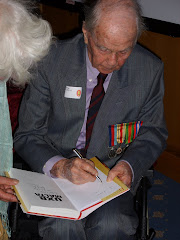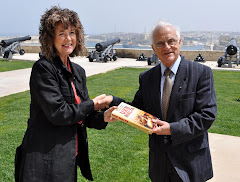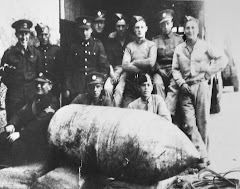Former bomb disposal officers whose service spans seven decades stood to attention as a roll of honour carrying the names of more than 500 men killed carrying out this dangerous task was played out before them. The act of remembrance was part of a moving presentation commemorating the 70th anniversary of Royal Engineers Bomb Disposal at the RE Museum in Gillingham. The event included the official UK launch of UXB Malta, the history of RE Bomb Disposal on the Island from 1940 to 1944.
The event brought together former wartime Bomb Disposal Officer Lt George Carroll with Major (Retd) Simon Cooke, RE, who recently served in Explosive Ordnance Disposal (EOD) in Bosnia and Afghanistan. Major Cooke compared the challenges of present day EOD operations with the first years of the service during World War 2:
“I think that the principle difference is a shift in focus from dealing with factory made, mass-produced munitions and bombs that have failed to go off [in 1940], to improvised terrorist devices today.” Major Cooke also described the way in which modern technology is used to reduce risk by taking the bomb disposal officer out of direct contact with the bomb, such as sophisticated robots which can attack the bombs themselves but also monitor and sometimes jam signals which could trigger the bomb.
However, he was also keen to point out the similarities between the work of the World War 2 bomb disposal officer and his modern day counterpart, whether in Iraq or Afghanistan – or in the UK. “Who would have thought that the bombs dropped in the Blitz in London would still crop up today? But they do.” And RE bomb disposal officers still deal with them in very the same way, employing the same techniques and equipment that they did in World War 2.
But Simon Cooke had other reasons to feel a close affinity with 92 year old George Carroll: “Some things in bomb disposal never change; the capacity to think through a technical problem very quickly; to improvise in the most demanding, high pressure and stressful of circumstances; and to follow through and execute your plan to dispose of a high explosive bomb (of whatever description); something that, if you get it wrong, you know will kill you. This places massive responsibility on young shoulders; it did in World War 2. It does now.
… the very nature of bomb disposal is, for safety reasons, a one-man-risk. At the cutting edge, bomb disposal is not a team activity, it is an individual activity. You live or die on your own wits, skill and judgement. And that takes courage.”
It seems the unifying similarity between bomb disposal officers throughout the past 70 years is the selfless and cool courage of young men who, despite all their achievements, remain typically modest and self-effacing.
SIMON COOKE is now Managing Director of 6 Alpha Associates, a niche security and risk management consultancy providing services in EOD, counter-terrorism and business resilience. www.6alpha.com
Subscribe to:
Post Comments (Atom)






No comments:
Post a Comment